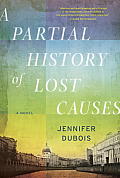
More than a few reviews of
A Partial History of Lost Causes have described Irina as a Harvard graduate and/or lecturer, which she's actually not — she teaches at a technical college in Boston's South End, and her alma mater is lazily located in Somerville, home of my own alma mater, Tufts, though both of these facts are only briefly mentioned — and it's interesting to me how horrified and embarrassed I always am by this mistake, as though people think I'm trying to claim a Harvard connection I don't have. As though I'd have the audacity to write from a Harvard woman's point of view! But then I remind myself that I've actually done something far worse than that: I've written from the point of view of a world chess champion, when I am, shamefully, no chess player at all.
I did play as a child with my father, and I've always been interested in the game — its elegance, its metaphorical power, its Old World cachet. (As a young, strange child, I think I often imagined that in my future life I'd live like some kind of fancy retired British general from the turn of the last century, which would naturally include having lots of chess sets all around. I truly don't know where I got this.) And one of the few autobiographical moments in the book comes when Irina beats her father at chess for the first time and is inordinately pleased with herself, only to realize years later that this moment in fact must have announced the beginning of her father's illness. But as an adult, I play chess only rarely and always badly; my brain basically doesn't fully register that there's a spatial dimension to the world (when I was a child, my parents were told by a pained-looking tester that my spatial reasoning skills were "within normal range;" in college I'd sit five feet away from the TV and think I was blocking my roommate's view of it.)
So in writing about chess for Partial History, I hoped I could accurately and engagingly describe what chess looks like, and possibly hazard some psychological guess at what chess feels like, but I knew I could never hope to imagine, on my own, how the games might actually work. Instead, I stole them — I lifted moves from famous matches, acted them out on my chessboard, and then tried to describe the way the games progressed with as much verve as possible, hoping to make the scenes lively and accessible for players and non-players alike. But I also wanted to include the occasional obscure reference or allusion for any serious followers of the game who might read the book — thus the Bezetov vs. Rusayev match is, move for move, Kasparov against Karpov; Kasparov and Bezetov make the same mistake in the same sequence in their fatal games against the Deep Blue computer program; and even Bezetov's match against his old mentor at the chess academy is, as a kind of in-joke, based on another, much more famous game.
Beyond the games themselves, chess solidly insinuated itself into the book as a motif. It was interesting to watch chess iterate through the story — in some ways I was conscious of, and in other ways I only saw in retrospect. The structure of the book — Aleksandr and then Irina's sections — came to feel like a chess game: one character moves, and then another. And the game provided a vocabulary for both the philosophical and political concerns of the novel — in terms of one move forcing the next, the procession against inevitable defeat. Chess became so central that I think it's debatable whether the politics in the book aren't, at least sometimes, a metaphor for chess, instead of the other way around. And the ending, as I've remarked elsewhere, has something of the feel of a chess move, I think. Writing Partial History has given me a deeper, more profound appreciation for chess, and for the terrifyingly smart people who play it well. Maybe someday one of them will teach me. But I suspect it would be an uphill battle.